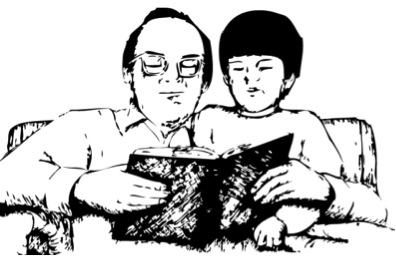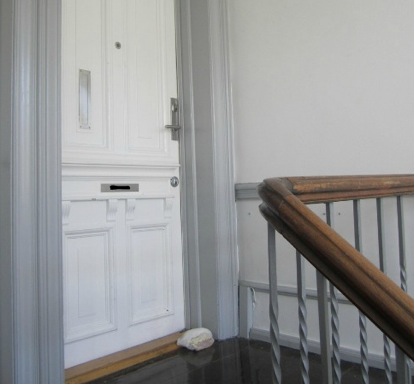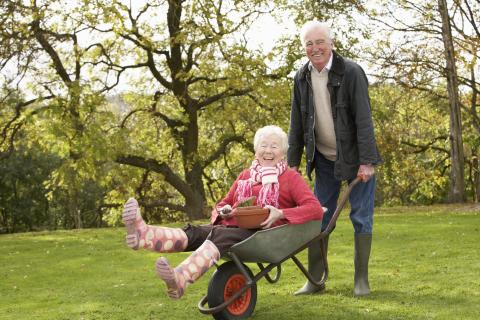Svend is 48 years old. He and his sister grew up in southern Denmark. Their parents provided much comfort and support as he and his sister were growing up. They provided them with food and clothes, love, they looked after Svend and his sister when they were ill, and even helped out financially as Svend moved to Copenhagen to study in his early twenties.
As many of us when we grew up, Svend now feels a need (out of love for his parents) to provide help and assistance to his parents in return for the services previously given to him and his sister as they grew up. Svend tries to help out as much as he can, even if that means a bit of travel once in a while. Svend and his sister try to help out their now aging parents as much as possible with for example grocery shopping, transportation and more labor-intensive activities – like when last summer their parents’ house had to be repainted. Also, it has become more and more common in the last two years for Svend to help out with what appear to be simpler tasks such as changing light bulbs, as his parents do not feel safe anymore standing on a chair or ladder. Sometimes Svend brings his grandson Morten when he travels to his parents. Morten is 8 years old and loves to hear his grand-grandfather talk about ‘the good old days’. However, sometimes he also misses his videogame console and cannot understand why his grand grandpa does not fancy one.
This story shows that reciprocal service exchange may depend on personal relationships and most interestingly: giving and taking may be separated over a long period of time.
Category: stories
Neighbors
Ulla and Anne are neighbors and friends. They have lived side by side since Anne moved into the stairwell four years ago. It was after her husband had passed away. In my conversations with them, they tell how they share a lot of different things during their daily lives together. If they have been grocery shopping, and there were only big bags of carrots, they share a bag between them. They also check in on each other every day to see that everything is ok. Anne often has guests. She has a large family and a lot of grandchildren who often come to visit. If she has leftovers, she often go by Ulla with them. Ulla enjoy going to flea markets. If she finds something she knows Anne wants she calls her to see if she should buy it for her. Ulla has also promised Anne’s granddaughter to take her to the flea market.
Maintaining masculinity through driving
”Sometimes I get my neighbor, Carl, to drive me if I’m going somewhere that’s hard to reach with public transportation. He often doesn’t want money, but I don’t like if friends are doing me favors without getting anything in return. I’m good at knitting, so last month when I was going to the airport and it was a bit tricky to take public transportation with my large suitcase, I offered Carl a pair of home-knitted socks if he drove me there. He was happy to do that”. (Joan, 75 years old, project Senior:Interaction).
Joan uses her knitting skills as a way to offer Carl something in return for the favor he does her. Joan has found a way to return favors with something she is good at, and in this case without disrespecting Carl’s wish of not receiving any money.
From sharing to friendship
Hans is retired and lives alone in his house after he became a widower several years ago. Life was in many ways difficult for Hans after his wife passed away but last year he decided to embrace life again and develop new interests. Encouraged by his son he bought a computer, but learning how to use it turned out to be a major challenge for Hans.
Fortunately Hans discovered that help was readily available a few houses down the road where Henning lives. Henning is also retired but due to failing health he has found it increasingly hard to clear the pathway in front of his house for snow during wintertime. Last year Hans politely volunteered to clear the snow for Henning. When Hans told Henning about his computer problems, Henning saw a chance to return the favour.
Henning is very good with computers thanks to his work experience, and he found it easy to bring Hans online and interesting to explain him the possibilities of modern technology and the world wide web.
Today a friendship has developed that reaches beyound their exchange of favours.
A Give&Take Scenario
Beth is 73 and lives in a local community called Æblehaven in Frederiksberg. She used to be a conservator at an art museum. Her husband passed away three years ago, while they were still planning to enjoy life with travelling, local theatre, and looking after their tiny garden and five grandchildren.
Paul, 69 years old, lives in the same apartment complex. He was divorced 15 years ago, and never remarried. He retired four years ago after 40 years as a schoolteacher. Paul has an urban garden plot not far away where he spends time in his carpenter workshop. Since the divorce, his garden has grown a little wild.
Anne, a retired expert in permaculture, recently moved in next to Beth. Anne, Paul and Beth are all subscribers to the Give&Take neighbourhood portal.
Beth has created a profile with her interests and experience. She has listed cooking, simple garden work, embroidery, and painting restoration.. Paul has also become a member after Beth encouraged him to join. He has listed driving, shopping, carpenter work and handyman-work in general. Beth is re-decorating her hall and has been to IKEA to buy a new lamp to mount on the wall. She grabs her new tablet computer and taps on the Give&Take icon. She notices that she has plenty of credit on her sharing balance – after looking after children in the neighbourhood several times – and puts up a task request on the Give&Take portal about mounting her lamp. She remembers to click the ‘bring own tools’ box, and hope that somebody replies soon. After two hours she hears an alert from her phone indicating a response. She finds the tiny phone display difficult to work with, so she only uses the Give&Take mobile app when she is not at home. Instead, she turns on her tablet computer. Paul has replied and suggested three alternative timeslots for performing the task. She picks the first one, tomorrow at 11am. The next day Paul arrives, and the drilling and mounting done in less than an hour. Beth is very happy with the look of the new lamp.
While Paul is cleaning up and collecting his tools, Beth suggests that he stays for an open sandwich with her homemade marinated herring while they negotiate which level the drilling task accounts for in the system. They agree that drilling is a small service, based on the examples that Paul look up via his Give&Take app on the phone. Paul is happy now: Beth’s homemade herring is one of his favorites, and now he has enough credit have some help for his overgrown garden plot. He remembers that Anne is offering a course on urban gardening through the Give&Take portal. Previously he had exchanged services with a young family to help with the plot but he decides that it is probably even better to learn himself how to handle the garden. And you always meet a lot of nice people at the Give&Take courses.
(This story if fictional. It describes how Give&Take could be used by senior citizens to share skills and services in their local community.)




